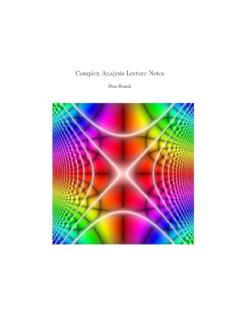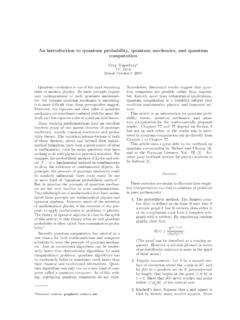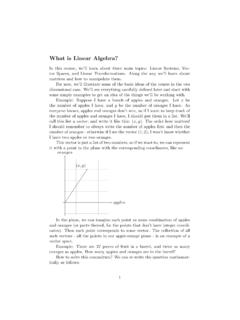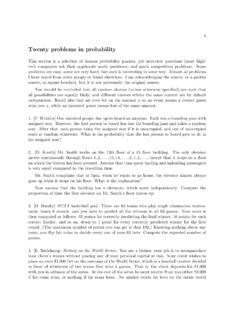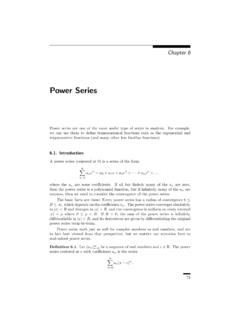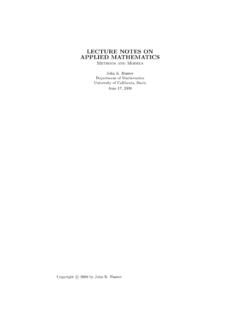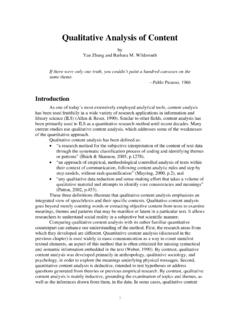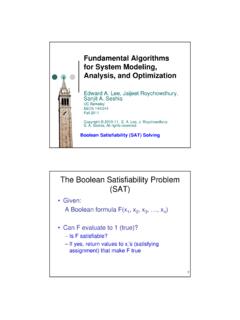Transcription of The Fundamental Theorem of Algebra
1 MAT067 University of California, DavisWinter 2007 TheFundamentalTheoremofAlgebraIsaiah Lankham, Bruno Nachtergaele, Anne Schilling(February 13, 2007)The setCof complex numbers can be described as elegant, intriguing, and fun, but whyare complex numbers important? One possible answer to this question is theFundamentalTheorem of Algebra . It states that every polynomial equation in one variable with complexcoefficients has at least one complex solution. In other words, polynomial equations formedoverCcan always be solved overC. This result has several equivalent formulations inaddition to a myriad of different proofs, one of the first of which was given by the eminentmathematician Carl Gauss in his doctoral thesis [2].
2 The aim of these notes is to provide a proof of the Fundamental Theorem of Algebrausing concepts that should be familiar to you from your study of Calculus, and so we beginby providing an explicit 1( Fundamental Theorem of Algebra ).Given any positive integern 1and anychoice of complex numbersa0, a1, .. , an, such thatan6= 0, the polynomial equationanzn+ +a1z+a0= 0(1)has at least one solutionz is a remarkable statement. No analogous result holds for guaranteeing that a realsolution exists to Equation (1) if we restrict the coefficientsa0, a1, .. , anto be real , there does not exist a real numberxsatisfying an equation as simple asx2+ 1 = , the consideration of polynomial equations having integer (resp.)
3 Rational) coeffi-cients quickly forces us to consider solutions that cannot possibly be integers (resp. rationalnumbers). Thus, the complex numbers are special in this statement of the Fundamental Theorem of Algebra can also be read as follows: Anynon-constant complex polynomial function defined on the complex planeC(when thoughtof asR2) has at least one root, , vanishes in at least one place. It is in this form that wewill provide a proof for Theorem how long the Fundamental Theorem of Algebra has been around, you shouldnot be surprised that there are many proofs of it. There is even an entire book [1] solelydevoted to exploring the mathematics behind thirteen distinct proofs.
4 Different proofs arisefrom attempting to understand the statement of the Theorem from the viewpoint of differentbranches of mathematics. This quickly leads to many non-trivial interactions with such fieldsof mathematics as Real and Complex Analysis, Topology, and (Modern) Abstract 2006 by the authors. These lecture notes may be reproduced in their entirety for non-commercial diversity of proof techniques available is yet another indication of how Fundamental anddeep the Fundamental Theorem of Algebra really many first courses in Linear Algebra , we could easily be content with just acceptingthe statement of the Theorem and deferring a discussion of its proof to a more advancedmathematics course.
5 There is, however, a proof that uses nothing more than ideas thatshould be familiar to you from the study of Differential Calculus. How could you not wantto see such a proof now?To prove the Fundamental Theorem of Algebra , we will need theExtreme Value Theoremfor real-valued functions of two real variables, which we state without proof. In particular,we formulate this Theorem in the restricted case of functions defined on theclosed diskDofradiusR >0 and centered at the origin, ,D={(x1, x2) R2|x21+x22 R2}. Theorem 2(Extreme Value Theorem ).Letf:D Rbe a continuous function on theclosed diskD R2. Thenfis bounded and attains its minimum and maximum values onD.
6 In other words, there exist pointsxm, xM Dsuch thatf(xm) f(x) f(xM)for every possible choice of pointx we define a polynomial functionf:C Cby settingf(z) =anzn+ +a1z+a0asin Equation (1), then note that we can regard (x, y)7 |f(x+iy)|as a functionR2 a mild abuse of notation, we denote this function by|f( )|or|f|. As it is a compositionof continuous functions (polynomials and the square root), we see that|f|is :C Cbe any polynomial function. Then there exists a pointz0 Cwhere the function|f|attains its minimum value a constant polynomial function, then the statement of the Lemma is triviallytrue since|f|attains its minimum value at every point inC.
7 So choose, ,z0= not constant, then the degree of the polynomial definingfis at least 1. In thiscase, we can denotefexplicitly as in Equation (1). That is, we setf(z) =anzn+ +a1z+a0withan6= 0. Now, assumez6= 0, and setA= max{|a0|, .. ,|an 1|}. We can obtain a lowerbound for|f(z)|as follows:|f(z)|=|an||z|n 1 +an 1an1z+ +a0an1zn |an||z|n(1 A|an| k=11|z|k)=|an||z|n(1 A|an|1|z| 1).For allz Csuch that|z| 2, we can further simplify this expression and obtain|f(z)| |an||z|n(1 2A|an||z|).2It follows from this inequality that there is anR >0 such that|f(z)|>|f(0)|, for allz Csatisfying|z|> R. LetD R2be the disk of radiusRcentered at 0, and define a functiong:D R, byg(x, y) =|f(x+iy)|.
8 Thengis continuous, and so we can apply Theorem 2 in order to obtain a point (x0, y0) Dsuch thatgattains it minimum at (x0, y0). By the choice ofRwe have that forz C\D,|f(z)|>|g(0,0)| |g(x0, y0)|. Therefore,|f|attains its minimum inz=x0+ now prove the Fundamental Theorem of of Theorem our argument, we rely on the fact that the function|f|attains itsminimum value by Lemma 3. Letz0 Cbe a point where the minimum is attained. Wewill show that iff(z0)6= 0, thenz0isnota minimum, thus proving by contraposition thatthe minimum value of|f(z)|is zero. Therefore,f(z0) = (z0)6= 0, then we can define a new functiong:C Cby settingg(z) =f(z+z0)f(z0),for allz thatgis a polynomial of degreen, and that the minimum of|f|is attained atz0if andonly if the minimum of|g|is attained atz= 0.
9 Moreover, it is clear thatg(0) = explicitly,gis given by a polynomial of the formg(z) =bnzn+ +bkzk+ 1,withn 1 andbk6= 0, for some 1 k n. Letbk=|bk|ei , and considerzof the formz=r|bk| 1/kei( )/k,(2)withr >0. Forzof this form we haveg(z) = 1 rk+rk+1h(r),wherehis a polynomial. Then, forr <1, we have by the triangle inequality that|g(z)| 1 rk+rk+1|h(r)|.Forr >0 sufficiently small we haver|h(r)|<1, by the continuity of the functionrh(r) andthe fact that it vanishes inr= 0. Hence|g(z)| 1 rk(1 r|h(r)|)<1,for somezhaving the form in Equation (2) withr (0, r0) andr0>0 sufficiently then the minimum of the function|g|:C Rcannot possibly be equal to now conclude these notes with several more Fundamental facts about polynomials,including an equivalence form of the Fundamental Theorem of Algebra .
10 While these factsshould be familiar to you, they nonetheless require careful formulation and a positive integern 1and any choice of coefficientsa0, a1, .. , an C,wherean6= 0, define the functionf:C Cby settingf(z) =anzn+ +a1z+a0, z other words,fis a polynomial function of degreen. Then1. given any complex numberw C, we have thatf(w) = 0if and only if there exists apolynomial functiong:C Cof degreen 1such thatf(z) = (z w)g(z), z there are at mostndistinct complex numberswfor whichf(w) = 0. In other words,fhas at mostndistinct ( Fundamental Theorem of Algebra , restated) there exist exactlyn+ 1complex numbersw0, w1.
